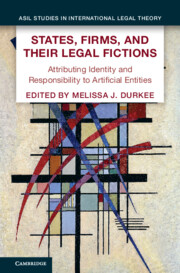 States, Firms, and Their Legal Fictions
States, Firms, and Their Legal Fictions Attribution and Construction of the Shareholder State
from Part I - International Attribution
Published online by Cambridge University Press: 29 February 2024
As state ownership of private firms grows, morphs, and globalizes, states increasingly channel their influence through the financialized markets. The ensuing merger of the state’s commercial and sovereign roles suggests that state ownership is, again, becoming a vector of sovereign authority. This chapter analyzes the international legal system that has developed around surging state ownership. It suggests that the legal construction of distinctive “shareholder identities” in international economic law plays a key role in this complex regulatory matrix. Specifically, the chapter focuses on how arbitral tribunals adjudicating claims arising from international investment treaties use attribution, a doctrine of customary international law, in creating, maintaining, and disciplining state shareholders. Arbitral tribunals use the analytical category of the state shareholder in order to delineate and construct state and company identities and to understand the economic, political, and legal implications of those identities in the the global economy. Accordingly, the interactions between substantive international economic law and the law of state responsibility form important, but underappreciated, elements of this constitutive process, which comes to affect the institutional design of state shareholding and disincentivize hands-on control over state-owned entities.
To save this book to your Kindle, first ensure [email protected] is added to your Approved Personal Document E-mail List under your Personal Document Settings on the Manage Your Content and Devices page of your Amazon account. Then enter the ‘name’ part of your Kindle email address below. Find out more about saving to your Kindle.
Note you can select to save to either the @free.kindle.com or @kindle.com variations. ‘@free.kindle.com’ emails are free but can only be saved to your device when it is connected to wi-fi. ‘@kindle.com’ emails can be delivered even when you are not connected to wi-fi, but note that service fees apply.
Find out more about the Kindle Personal Document Service.
To save content items to your account, please confirm that you agree to abide by our usage policies. If this is the first time you use this feature, you will be asked to authorise Cambridge Core to connect with your account. Find out more about saving content to Dropbox.
To save content items to your account, please confirm that you agree to abide by our usage policies. If this is the first time you use this feature, you will be asked to authorise Cambridge Core to connect with your account. Find out more about saving content to Google Drive.